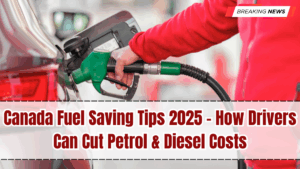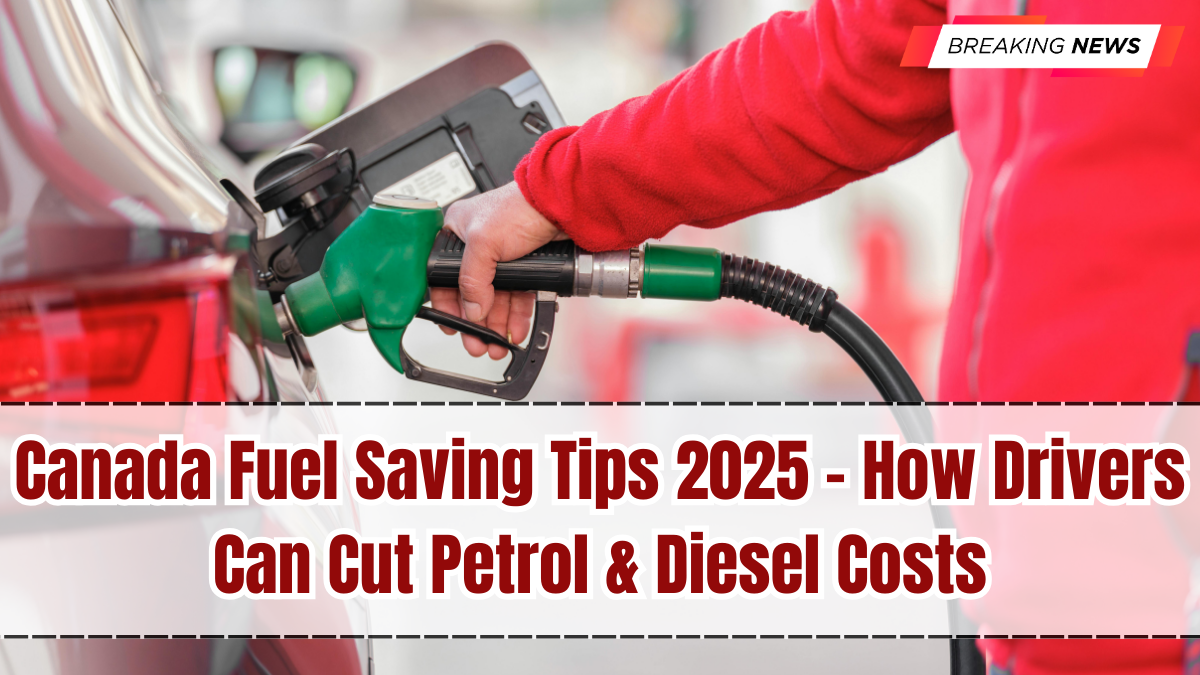The Canada Fuel Saving Tips 2025 guide comes at a time when drivers are struggling with record-high petrol and diesel prices. With fuel averaging nearly $2 per litre in major provinces, many households are adjusting their budgets just to keep cars on the road.
But saving fuel is not just about cutting costs. It also helps reduce emissions, extends your vehicle’s life, and supports Canada’s long-term climate goals. By adopting smarter driving habits, maintaining vehicles properly, and using modern technologies, Canadians can see real savings.
So what are the most effective ways to make every litre last longer? Let’s explore.

Why Are Fuel Costs So High in 2025?
Fuel prices in 2025 remain stubbornly high for several reasons.
Global crude oil prices have been hovering near $95 a barrel. This sets a high base cost for petrol and diesel imports. Federal carbon tax increases earlier this year added more cents per litre, raising overall expenses. A weaker Canadian dollar also makes imported fuel pricier, especially in provinces without local refining advantages.
Provinces like British Columbia and Quebec add extra regional taxes, making their drivers pay some of the highest pump prices in the country. While Canadians can’t control these macroeconomic issues, they can manage their fuel use better.
Can Driving Habits Really Cut Fuel Costs?
Yes, your driving style has a direct impact on fuel consumption.
Avoid aggressive acceleration, as hard starts burn fuel quickly. Smooth and gradual acceleration can reduce fuel use by up to 15%. Keeping a steady speed on highways with cruise control prevents unnecessary fuel wastage.
Idling is another silent fuel drainer. Just ten minutes of idling consumes enough petrol to drive almost two kilometers. Planning trips to avoid traffic congestion or combining multiple errands into one trip saves both time and money.
How Does Car Maintenance Improve Fuel Efficiency?
Routine car maintenance is one of the most overlooked ways to save fuel.
Keeping tires properly inflated reduces rolling resistance and improves mileage. Under-inflated tires alone can increase fuel consumption by 3–4%. Regular oil changes keep engines running smoothly, preventing unnecessary strain and fuel burn.
Air filters also play a role. A dirty air filter reduces airflow, forcing the engine to work harder. Replacing filters on time can increase efficiency instantly. Regular servicing ensures that spark plugs, brakes, and transmission systems are all optimized for fuel economy.
Are Fuel-Efficient Cars Worth It in 2025?
With fuel prices so high, many Canadians are rethinking vehicle choices.
Hybrid cars like the Toyota Prius or Honda Accord Hybrid are seeing higher demand in 2025. They combine petrol engines with electric motors, offering nearly double the mileage of standard cars. Plug-in hybrids give drivers the option of short electric-only trips, further reducing fuel use.
Electric vehicles (EVs) are another growing trend. Although upfront costs remain high, government rebates and lower operating expenses make EVs attractive long-term options. For drivers who still rely on petrol or diesel, choosing smaller engines or turbocharged fuel-efficient models is a practical step.
What Role Does Technology Play in Saving Fuel?
Modern technology gives drivers more control over fuel consumption.
Many cars now include eco-driving modes that adjust engine response and transmission shifts for maximum efficiency. Smartphone apps and built-in infotainment systems track real-time fuel use, helping drivers spot bad habits.
Navigation apps suggest routes with less traffic, saving both time and fuel. Some insurance companies even offer discounts for drivers who use telematics devices to prove safe and efficient driving.
Can Canadians Save Money With Alternative Fuels?
While petrol and diesel dominate, alternatives are slowly emerging.
Compressed Natural Gas (CNG) and biofuels are gaining limited traction in some provinces. These options often cost less per litre equivalent compared to traditional fuels. EV charging stations are expanding quickly, making electricity a more realistic option for urban drivers.
Government incentives in 2025 are encouraging both consumers and businesses to experiment with greener and cheaper energy sources for vehicles.
How Can Businesses Save Fuel in 2025?
For businesses operating fleets, fuel costs represent one of the largest expenses.
Logistics companies are increasingly adopting fuel management software to monitor driver behavior and optimize routes. Fleet-wide driver training programs that teach efficient driving reduce consumption significantly. Some firms are transitioning to hybrid or EV vans for urban deliveries, cutting daily fuel bills dramatically.
These strategies don’t just reduce expenses—they also improve sustainability credentials, which matter more to customers in 2025.
What Are Everyday Tips for Households?
Small lifestyle changes add up when it comes to saving fuel.
Avoid carrying unnecessary weight in the trunk, as added load increases fuel burn. Remove roof racks or carriers when not in use, since they increase drag. Refuel during cooler hours of the day to minimize evaporation losses.
Even choosing where to refuel matters. Apps like GasBuddy help find the cheapest stations nearby, often saving 5–10 cents per litre. Over the course of a year, that difference adds up to hundreds of dollars in savings.
Conclusion
The Canada Fuel Saving Tips 2025 guide shows that while Canadians can’t change global oil prices or government taxes, they can change how they drive and maintain their vehicles. By making smarter decisions—whether through smoother driving, better car care, or exploring hybrid and EV options—drivers can fight back against rising fuel costs.
Fuel efficiency isn’t just about saving dollars at the pump. It’s also about building a greener, more sustainable future for Canada.
FAQs
Why are fuel prices so high in Canada in 2025?
Because of global crude oil costs, federal carbon taxes, weak currency exchange rates, and provincial taxes.
Can better driving habits really save money?
Yes, smoother acceleration, steady speeds, and avoiding idling can cut fuel use by up to 15%.
What maintenance steps save the most fuel?
Tire inflation, regular oil changes, and replacing air filters all boost efficiency.
Are hybrids and EVs worth considering in 2025?
Yes, hybrids and EVs offer major fuel savings and are supported by government incentives.
What everyday steps help households save fuel?
Lighten vehicle loads, remove roof racks, refuel during cooler hours, and use apps to find cheaper fuel stations.
Click here to know more.
